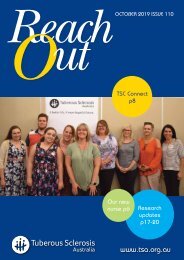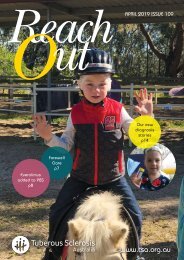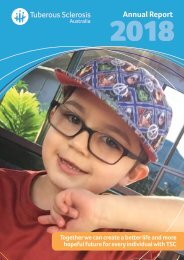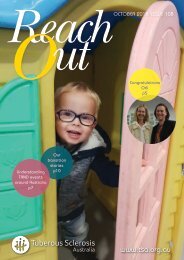Reach Out, April 2016, isue 103
The latest news from Tuberous Sclerosis Australia and up to date information on tuberous sclerosis information, support and research.
The latest news from Tuberous Sclerosis Australia and up to date information on tuberous sclerosis information, support and research.
You also want an ePaper? Increase the reach of your titles
YUMPU automatically turns print PDFs into web optimized ePapers that Google loves.
Personal Stories<br />
Know your child’s funding package. It’s easy to file paperwork<br />
away once you’re done with your yearly planning meeting and<br />
think, well that’s that done for another year. Needs change,<br />
priorities differ, children develop. Remember you can ask for a<br />
plan review at any time. Liam had $3000 worth of funding a year<br />
for continence aids at one stage, $1100 of which was for adult<br />
diapers. He didn’t even use adult diapers, so we diverted these<br />
funds elsewhere. On the other hand, don’t be in too much of a<br />
hurry to let go of funding if there’s a chance your child will need<br />
it in the future, it’s always worth keeping the worst-case scenario<br />
in mind. In our plan reviews, we’ve mostly been successful in accessing<br />
the services Liam needs, although we have had one plan<br />
revision declined.<br />
So you think you’re already good at filling out forms? Service<br />
providers and planning coordinators can only see the bare<br />
minimum of information you provide about your child to the<br />
NDIS. They will want to get exactly as clear an idea about him or<br />
her as the NDIS did at your planning meetings, so be prepared<br />
to repeat yourself a lot. The time spent writing or talking about<br />
your child will be enormously helpful in getting their supports<br />
just right. Even once supports are in place, keep the information<br />
coming. I never stop talking about Liam to all of his providers.<br />
I’m always chatting or emailing, I send photos of the things<br />
we’ve been doing, and assemble little photo albums that travel<br />
around with him. In return, I often receive texts or emails from<br />
his carers with photos or videos of what he’s been up to that day.<br />
He has round the clock care in his brand new unit<br />
from a wonderful team of carers, who value him as a<br />
unique person and celebrate his achievements<br />
Check online regularly to keep track of what has been spent.<br />
NDIS can provide you with an activation code. Be aware that<br />
service providers can see the funding details around the portfolio.<br />
Potentially there is a risk they will ‘up the ante’ if they can<br />
see extra funding hasn’t been used, especially if they want the<br />
business for themselves. Liam’s Coordinator of Supports is careful<br />
to check what has been billed is correct. Note that you don’t<br />
necessarily have to use all the funding in a particular line. You<br />
won’t lose funding the following year – although if you haven’t<br />
used it all you may wish to review it.<br />
Ask questions. Ask a lot of questions.<br />
And take someone with you to meetings.<br />
I can’t tell you how many times<br />
I was in meetings with planners and<br />
coordinators and didn’t understand<br />
half of what they were saying. Now,<br />
I’m not the world’s most thick-headed<br />
person, but I’m sure I’m not the only<br />
parent who has sat there thinking “what on earth have they<br />
just said?” instead of stopping and saying, “No, I’m afraid I<br />
don’t understand. Please explain what you mean in layman’s<br />
terms.” I spent a lot of time feeling ashamed of myself, and that<br />
I should know the answer if only I’d read the paperwork properly,<br />
and what would they think if I asked such a silly question?<br />
There are no silly questions, only silly people. Like me. Luckily,<br />
my husband isn’t, and wasn’t too shy to ask for clarification<br />
when it was needed.<br />
Talk to providers about your vision for your child. Tell<br />
them all about him or her, send pictures, relate anecdotes,<br />
swap favourite recipes. Take them along to doctor’s or<br />
dentist’s appointments with your child if you can (it’s<br />
good preparation if they have to do this themselves in the<br />
future). Give them the opportunity to participate in the<br />
journey of a real person, a person with foibles, with likes<br />
and dislikes, with pets and family photos whose favourite<br />
colour is blue and who likes to sniff people to work out<br />
if they’re OK to hang out with. Everyone seeks meaning<br />
in the work they do, and carers do one of the world’s<br />
most challenging jobs in my opinion. So involve them,<br />
let them know how they’re valued and how meaningful<br />
their work is to you and your child.<br />
“So many of our dreams at first seem impossible, then<br />
they seem improbable, and then, when we summon the<br />
will, they soon become inevitable.” Christopher Reeve<br />
Good luck with your adventure!<br />
16<br />
<strong>Reach</strong><br />
<strong>Out</strong><br />
APRIL <strong>2016</strong> ISSUE <strong>103</strong>


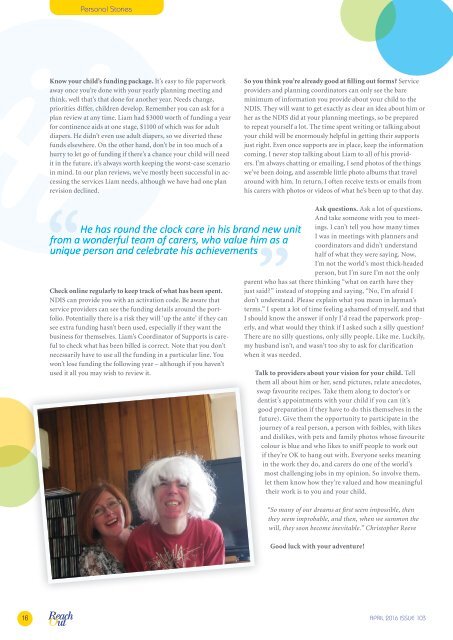


![TSA Reach Out April 2022 [Final]](https://documents.yumpu.com/000/066/687/587/3d369bd665bdb406a759500f62e2cfad0ccb7b3d/47512b4a703265727550565249426664566a727454513d3d/396a524e7354316d3867454b587243526164724c52673d3d.jpg?AWSAccessKeyId=AKIAICNEWSPSEKTJ5M3Q&Expires=1714744800&Signature=rIPXzsp9fAhI9ERkjVcVOl9gTV0%3D)
![TSA AR 2021 [WEB] (1)_FINAL](https://documents.yumpu.com/000/065/886/431/1afb21934ac6c444cd384e5fd7403d62e47080ce/426853747566526573646568546777594b4a4a5734513d3d/547274595943503850786275754544495972536c52513d3d.jpg?AWSAccessKeyId=AKIAICNEWSPSEKTJ5M3Q&Expires=1714744800&Signature=eEj410aKFlFMGuzIjfT300mmf%2BE%3D)

![TSA Reach Out Apr 2021 [WEB]](https://documents.yumpu.com/000/065/442/909/1e583cb2acba0eaa7f1aae53e14a0cf408aa56c4/7871796d694459464d707163324830746459484671673d3d/45356637637a3369494f764f4c3858495549795251513d3d.jpg?AWSAccessKeyId=AKIAICNEWSPSEKTJ5M3Q&Expires=1714744800&Signature=KswT%2BskI%2BwmDXDW3TvfEohnweNI%3D)




